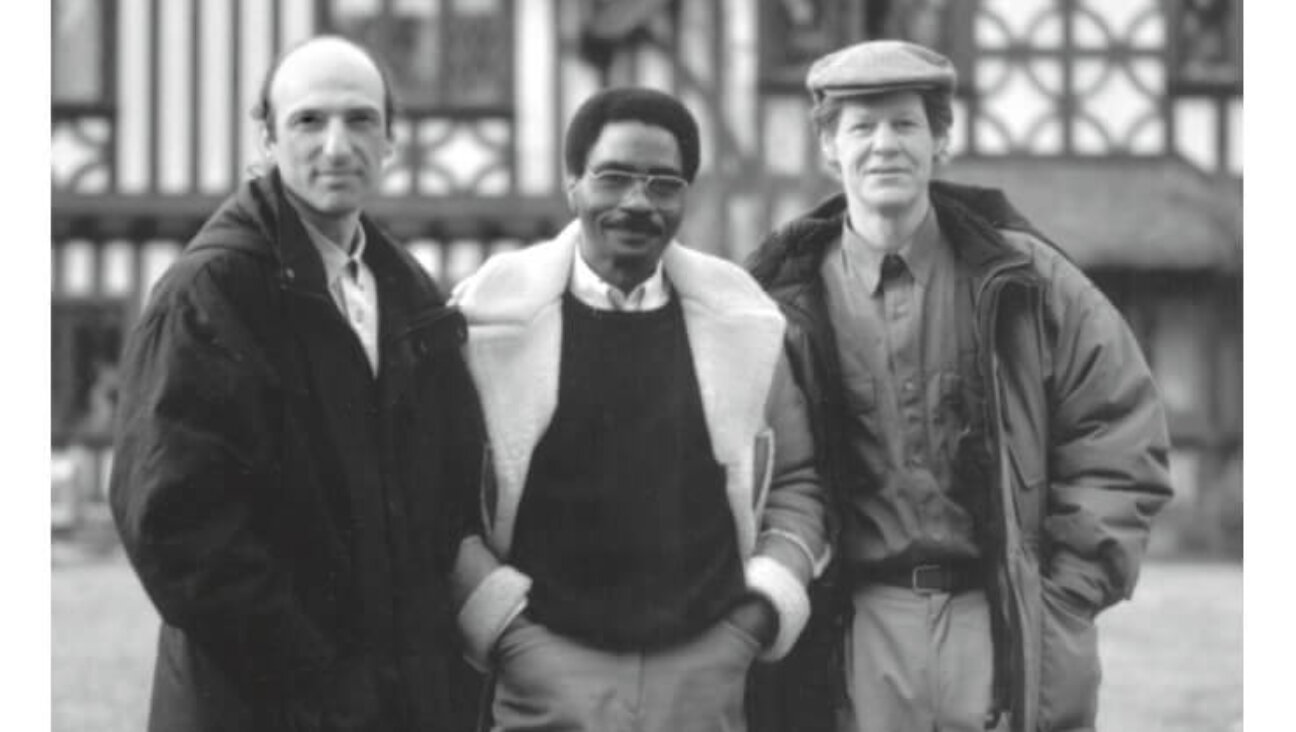Letter April 2, 2004
Our Lawless World
Columnist Kathleen Peratis presents a typically Western perspective on human rights and law in an age of terrorism (“Rule of Law, or the Law of the Jungle,” March 26). Missing totally, however, is the view of the adversary. From al-Qaeda to Hamas to Saddam Hussein, the intent, language and actions of these foes are consistent only with war.
Several wars are being conducted simultaneously on different fronts. Islamists are fighting global, total war against the West, while totalitarian states are fighting brutal wars against their own populations and the international system. The inadequacy of the fragile tissue of law as constraint or remedy is seen in the piles of newly dead, atop the previous mountains of the murdered. The incalculable threat posed by states like Iran or North Korea, not even laughably constrained by the United Nations and its inept organs, such as the International Atomic Energy Agency, promises to raise the stakes, and possibly the death toll, still higher.
Legal recourse is only possible in a world where law reigns. The secondary but unstated implications of Peratis’s column, and NGO culture as a whole, are that Western legal concepts must be imperialistically extended to the world. Ironically, this might be accomplished in Iraq. But until we somehow overcome the aggression and perhaps evil inherent in our very beings and achieve the much-sought-after utopia where law reigns supreme, we must recognize we are engaged in a war. Refusing to do so does no justice to our adversaries and their stated goals and means.
Alexander H. Joffe
Alexandria, Va.
It’s Not Greek To Me
In “Culture War, Take Two” (March 26), columnist David Klinghoffer compares liberals and supporters of gay marriage to those “progressive” Syrian-Greeks and their Jewish lackeys who oppressed our Judean ancestors.
This may be news to him, but those Greeks were slave-owning imperialists. And, did those “progressive” Greeks form trade unions, sponsor health insurance, have social security and support equal rights for women, too?
The Maccabees fought the good fight because the ancient Greeks tried to force their religion down the throats of our ancestors. In modern terms, their First Amendment rights were being violated. Who is forcing you to marry a man, Mr. Klinghoffer?
Sheldon Ranz
Merrick, N.Y.
A Win-Win Situation
Sheikh Ahmed Yassin and the other Hamas-niks claim to want to be martyrs (“The Killing of the Sheikh,” March 26). So, they want to die; Israel wants to kill them. It’s a win-win situation.
Paul Kujawsky
Valley Village, Calif.
A Struggle, But Not His
Your article on Ariel Foxman, the editor-in-chief of the new Cargo magazine, makes reference to Foxman’s position as editor-in-chief of his high school paper, The Struggle (“‘Metrosexy’ Son Takes the Helm of Condé Nast’s Cargo,” March 26).
More than 25 years ago, I was faculty adviser to the very first issue of Frisch High School’s fledgling newspaper. When students frequently complained about their heavy workload of study, exams and homework, then-principal Rabbi Menahem Meier often said to them, “High school is a struggle!” Thus, in semi-jest the name of our newspaper was born and has remained with us to this day.
Contrary to your article’s statement that “bizarrely” the name of our school’s newspaper was inspired by Hitler’s ideological manifesto “Mein Kampf,” The Struggle never had any connotative or other relationship either to Hitler or “Mein Kampf.”
We are extremely proud of the accomplishments of our alumnus Ariel Foxman, for whom high school was decidedly not a struggle.
Phoebe B. Weisbrot
Director, College Guidance
The Frisch School
Paramus, N.J.
Facing Uzbek Realities
As someone who has worked in Uzbekistan for international agencies, it was gratifying to read Stephen Schwartz’s corrective “Letter From Uzbekistan” (“Ex-Soviet Republic Counts Many Critics, Few Friends,” March 19).
Much needs to be done in Uzbekistan to secure civil rights, transparency and democracy, but the situation is not hellish nor it is deteriorating as some human rights groups would have us believe. After all, their mission, which is valuable and sometimes even courageous, as well as their funding require defense of victims of Islam Karimov’s authoritarian regime — not nuanced reporting of the situation in this key Central Asian ally of the United States.
Like the other Central Asian countries, Uzbekistan practices a tolerant and relaxed form of Islam, which tolerates alcohol, female equality and birth control. Few women are veiled. As for Jews, they are regarded as a treasured and traditional part of Uzbek culture. The Tashkent Jewish community center, Chesed, works effectively and openly, as do the other dozen such centers in the country. The Lubavitch synagogue requires no guards, unlike many in Western Europe. The prominent Israeli embassy in Tashkent works to help Uzbeks develop their agricultural economy and occasionally to help out Russian-speaking Israelis trying to do business in the country. Israeli athletes compete proudly in Tashkent’s annual tennis tournaments.
There are thousands of Muslims in Uzbekistan’s prisons, but many of them have been associated with such organizations as Hizb-ut-Tahrir, illegal throughout the region, which is struggling to transform all these countries into a new caliphate. While not openly violent in their tactics, Hizb-ut-Tahrir is antisemitic and anti-Western, like the apparently defunct Islamic Movement of Uzbekistan. Generally speaking, worshippers at mosques and peaceful Muslims are not bothered, though doubtless there have been unjust arrests and rough treatment. No one can say how many. Torture is now illegal but may still go on.
If Uzbekistan were judged by the standards we apply to Pakistan or Saudi Arabia or Egypt, it would look a lot better than it often does in the pages of The Washington Post.
Martin C. Spechler
Bloomington, Ind.
The writer is a professor of economics and faculty affiliate of the Inner Asian and Uralic National Resource Center at Indiana University.
Seeing Near and Far
It is a pleasant surprise to find myself writing to the Forward, not about the travails of Zionism, but rather to say “Bravo!” on your editorial endorsing the saving of the Hubble telescope “Postcards From Creation,” March 19).
You correctly noted that Hubble can see farther than any Earth-based telescope. In fact, it can also see more of that which is closer. In particular, Hubble can measure starlight at wavelengths in the ultraviolet, which the atmosphere filters out from Earth-based telescopes. This light provides fundamental insight into the structure and evolution of stars. My own doctoral dissertation in astrophysics more than 30 years ago involved the laboratory measurement and the calculation of those properties that determined how a star’s brightness in the ultraviolet could be related to the abundance of various atoms in the star. The Hubble telescope made the first measurements of these brightnesses, thus confirming not only the laboratory experiments, but the fundamental quantum theory that undergirded the calculations.
I do not endorse any and all space initiatives, because they are often political, and because their costs must be balanced against expenditures for critical societal problems. But Hubble is a proven success, and, as the Forward notes, society also runs on ambitions and dreams.
Jeffry V. Mallow
Professor of Physics
Loyola University Chicago
Chicago, Ill.
The writer is the immediate past president of the Labor Zionist Alliance.
Fixing Mideast Studies
H.R.3077, the International Studies in Higher Education Act, would establish an advisory board for the Title VI subsidies program for area studies (including Middle Eastern studies) in our universities. Your article “Groups Back Bill To Monitor Universities” (March 12) exaggerates the role of Jewish groups in the birth of the legislation by suggesting that they “initiated the bill.”
In fact, Rep. Peter Hoekstra of Michigan initiated the bill as part of the reauthorization process of the Higher Education Act. Jack Kemp and William Bennett’s organization Empower America played the leading role in lobbying for the bill’s provision for an advisory board. Most of the Jewish organizations that are now urging the Senate to adopt similar legislation endorsed the effort only months after the bill passed the House.
H.R.3077 is not about the Arab-Israeli conflict or academic freedom. It is about the role of universities in meeting new challenges facing the United States in the world. Title VI subsidies to universities are the tax dollars of all Americans, and all Americans have a stake in improved Middle Eastern studies.
Martin Kramer
Tel Aviv, Israel
The writer is the author of “Ivory Towers on Sand: The Failure of Middle Eastern Studies in America” (Washington Institute for Near East Policy, 2001).
A message from our CEO & publisher Rachel Fishman Feddersen

I hope you appreciated this article. Before you go, I’d like to ask you to please support the Forward’s award-winning, nonprofit journalism during this critical time.
We’ve set a goal to raise $260,000 by December 31. That’s an ambitious goal, but one that will give us the resources we need to invest in the high quality news, opinion, analysis and cultural coverage that isn’t available anywhere else.
If you feel inspired to make an impact, now is the time to give something back. Join us as a member at your most generous level.
— Rachel Fishman Feddersen, Publisher and CEO























